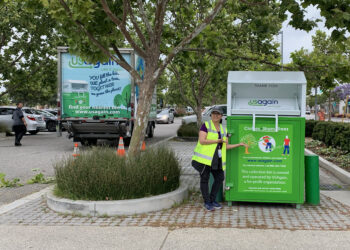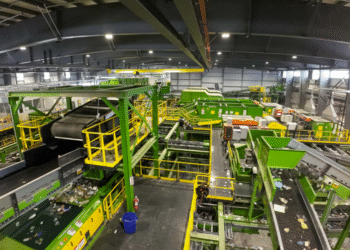As the novel coronavirus continues to spread throughout the U.S., state and local governments are working tirelessly to respond and adapt. The primary concern for all of us in this trying time is the health and safety of our communities, especially the essential workers in health care, sanitation, retail, transportation and public safety who are putting themselves at risk to help stop the spread of COVID-19.
Unfortunately, state and local governments are facing increasing pressure to reverse, delay or otherwise roll back environmentally beneficial waste-reduction policies, such as fees or bans on plastic bags, in the name of public health.
The plastics industry in particular has argued that plastic bags are the most sanitary option for transporting food home from restaurants and grocery stores, and it has urged governments to act swiftly to lift restrictions on plastic bags and other single-use plastics. The industry has specifically called out reusable bags as unsanitary, although there is no scientific evidence to support the claim that properly sanitized reusable bags contribute to the transmission of COVID-19.
To date, neither the Centers for Disease Control and Prevention (CDC) nor the World Health Organization has issued guidance advising against the use of reusable bags.
PSI has created a digital tracker to record the changes taking place across the United States. Thus far, Connecticut has lifted statewide fees on plastic bags while Massachusetts and New Hampshire have banned reusable bags in grocery stores, pharmacies, and – in the case of New Hampshire – all retail stores.
Massachusetts has also banned local jurisdictions from charging fees on single-use plastic, paper and compostable bags. Maine has delayed its recently enacted single-use plastic bag ban and 5-cent fee on paper bags until 2021. Several local jurisdictions across the country are placing bag bans and other single-use plastics policies on hold, as well. On a corporate level, many major chains, including Starbucks and Dunkin’, have restricted customers from bringing in reusable items, such as coffee mugs.
Repercussions of sidelining reuse
While the protection of our communities and essential workers is paramount in the short term, we must also acknowledge that increased use and disposal of single-use items has long-term implications for the environment and human health at each step of the consumer-products value chain, from production through waste management.
In the case of plastics, for instance, oil and natural gas extraction and refinement for plastics production causes chronic and sometimes fatal respiratory conditions, cancers, neurotoxicity, reproductive and developmental damage, and immune suppression in many thousands of people each year.
The everyday use of plastic products has been linked to cancer, endocrine disruption and other health problems for consumers. At their end-of-life, hundreds of thousands of tons of plastic products from the U.S. and other wealthier nations are shipped abroad to developing countries, where low-wage waste-pickers must sort through our rubbish to extract recyclable items. Much of this waste is openly burned, leading to further chronic health concerns. The conversion of petrochemicals into plastic products also has a tremendous carbon footprint.
While many suspensions on reusable items cite the quick disposal of single-use products as a boon to worker and consumer health, the resulting increase in waste adds to the challenges facing our already-strained collection system. The waste industry has braced for increased residential volumes since the start of the outbreak in the U.S. At the same time, the industry is dealing with a reduced workforce. As of April 9, at least 350 sanitation workers in New York City had tested positive for COVID-19.
Protecting communities from harmful chemicals and pollution has always been at the heart of local and state waste reduction policies such as bans or fees on plastic bags. While most of the rollbacks to these policies across the U.S. are temporary, it will be critical to ensure they do not lead to long-term policy reversals. The need for sustainable, sanitary reuse infrastructure to facilitate long-term waste reduction has become clear amid this crisis.
The role of EPR
Over the long term, product stewardship and extended producer responsibility (EPR) laws will help address many of the challenges with plastics and other single-use products in the U.S. by creating incentives for reuse, recycling and the production of materials with fewer environmental impacts, and by supporting infrastructure development for proper collection and recycling.
PSI’s recently released report, EPR for Packaging & Paper Products: Policies, Practices, & Performance, outlines problems faced by U.S. recycling programs and how EPR programs in four Canadian provinces have increased packaging recovery and recycling, reduced contamination and developed domestic markets for difficult-to-recycle materials.
As we look ahead to a post-COVID-19 future, PSI is hopeful that innovative product stewardship policies will provide avenues for reducing the production and consumption of single-use materials, increasing domestic reuse and recycling opportunities, and safeguarding public health and safety.
PSI will continue to track policy changes and advise members on responding to concerns about existing policies. If you have any updates on plastics or single-use policy changes stemming from the COVID-19 crisis, please add them to the tracker or contact Sydney Harris.
Sydney Harris is senior associate for policy and programs and Scott Cassel is CEO and founder of the Product Stewardship Institute (PSI).
The views and opinions expressed are those of the author and do not imply endorsement by Resource Recycling, Inc. If you have a subject you wish to cover in an op-ed, please send a short proposal to [email protected] for consideration.






























